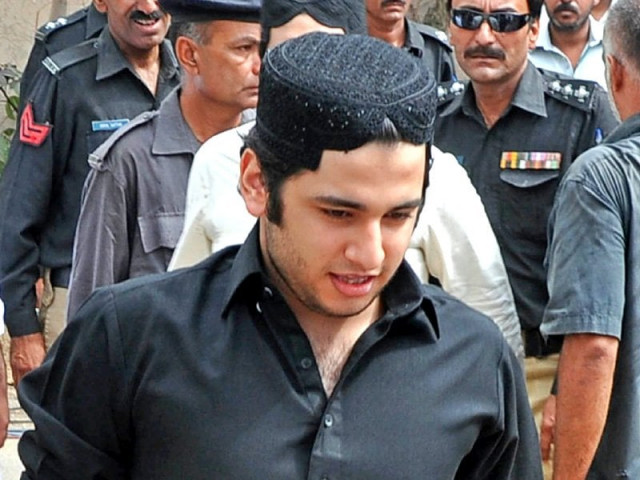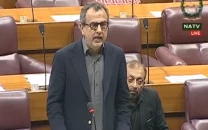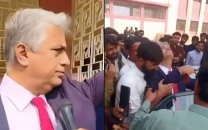Shahzeb murder case: SHC commutes death sentences of Shahrukh Jatoi, Siraj Talpur
The 2012 murder case has seen its fair share of twists and turns over the years

Shahrukh Jatoi. PHOTO: ATHAR KHAN/EXPRESS
The high court also upheld the life imprisonment sentence awarded to two other accused, Sajjad Talpur and Ghulam Murtaza Lashari. The decision was announced by Justice Muhammad Ali Mazhar and Justice Nazar Akbar on review petitions filed by the accused against their conviction.
During the hearing, the counsel representing the state pointed out that the prime accused was declared an adult aged above 18 years by a medical board. "Shahrukh's case cannot be tried under juvenile laws," he argued.
Shahrukh's lawyer said the families of the victim and the accused had reached an agreement and requested the court to acquit all the accused. "The victim's father has passed away and his mother and sisters have moved abroad," argued the counsel.
Shahzeb murder case: Police arrest Shahrukh Jatoi, two others after SC verdict
"Since the legal heirs of deceased Shahzeb have compounded the offense of Qatl-i-amad under section 302 of the Pakistan Penal Code, therefore, along the lines of dictum laid down by the Supreme Court with regard to the impact and effect of compounding offences under the provisions of PPC and Anti-Terrorism Act 1997, the Special ATA Appeal No 19 and 25/2013 to the extent of Nawab Siraj Ali Talpur and Shahrukh Jatoi are partly allowed," reads the verdict. "The death sentence awarded to Jatoi and Talpur is reduced from death penalty to life imprisonment under Section 7 (a) of Anti-Terrorism Act 1997," it adds.
The incident
Shahzeb Khan, the 20-year-old son of former Deputy Superintendent of Police Aurangzeb Khan, was gunned down on Saba Avenue in Defence Housing Authority (DHA) on the night of December 24, 2012.
Shahzeb had returned home from a wedding with his family when an employee of the accused verbally harassed his sister. He confronted the accused and demanded an apology.
The accused, however, were remorseless and refused to apologise for the behaviour of their employee. The issue was apparently resolved when Shahzeb's father intervened and tried to pacify both his son and the other party.
Shahzeb murder case: SC orders names of Shahrukh Jatoi, three others to be placed on ECL
Soon after, Shahzeb left his house in his car and was on Saba Avenue when the accused chased him down and shot him dead in public.
The murder sparked outrage across the country leading to then chief justice, Iftikhar Chaudhry, taking suo motu notice of the incident.
Guilty verdict
In June 2013, an anti-terrorism court (ATC) awarded the death penalty to Shahrukh and Siraj, while Sajjad and Ghulam were given life imprisonment. Shahrukh was handed down an additional three years in prison for illegal possession of a weapon. The ATC also directed the convicts to pay a Rs500,000 fine each.
As he walked out of the court after the verdict was announced, Shahrukh Jatoi posed with victory signs for the countless cameras trained on him. The remorseless behaviour again drew condemnations from civil society.
A few months after the verdict, however, the victim's father granted a pardon to the accused. Reportedly, the pardon was granted under duress. The convicts then again approached the SHC for a review of the verdict.
In November 2017, the SHC decided on the criminal review petition, set aside the capital punishment awarded to the two accused and ordered a retrial. The defence counsel had argued for the terrorism charges to be dropped considering the prime suspect was a juvenile at the time of the offence. Shahrukh's age had been contentious from the early stages of the trial when a medical report had determined his age to be between 17 and 18 years at the time of the incident. The report was rejected by the ATC and a seven-member medical board had subsequently determined that Shahrukh was no less than 19 years old.
The SHC, however, granted the defence's plea for removal of sections of the anti-terror law.
Released on bail
In December 2017, the sessions court released all the accused on bail. The move again sparked anger among the civil society and several activists approached the apex court against the SHC's verdict.
The activists included Jibran Nasir, Jamshed Raza Mahmood, Afiya Shehrbano Zia, Naeem Sadiq, Nazim Fida Hussain Haji, Zulfiqar Shah, Aquila Ismail, Fahim Zaman Khan, and Naziha Syed Ali, who filed a criminal petition in the Supreme Court, challenging the SHC order.
Civil society's petitions
The petition, filed through renowned lawyer Faisal Siddiqui, asserted that residents of the same city where Shahzeb was murdered, had filed a criminal petition for leave-to-appeal, challenging the SHC order for not applying ATA provisions and setting aside the conviction recorded by the trial court.
The petition said the incident of gruesome murder had created fear and insecurity among the general public. The civil society members claimed that the fear and panic among the residents of the area offered enough grounds for them to file the case, even though they did not directly know the deceased.
They said they were personally terrorised and intimidated by the murder.
In February 2018, the Supreme Court turned the petitions by civil society into a suo motu notice and set aside the 2017 SHC decision, ordering a retrial.
The apex court also restored terrorism charges framed against the accused - Shahrukh, Siraj and Sajjad - which had been removed by the SHC. The SC bench ruled that bails granted to the accused by the sessions court were against the law.
Shortly after the verdict was announced, the accused were taken into custody in Islamabad and handed over to the Sindh Police. Their names were also placed on the Exit Control List.
Over the course of one year, the SHC heard arguments from both parties in favour and against the convictions. The verdict, which was earlier reserved on March 11, was announced by the SHC bench on Monday.
Published in The Express Tribune, May 14th, 2019.



















COMMENTS
Comments are moderated and generally will be posted if they are on-topic and not abusive.
For more information, please see our Comments FAQ